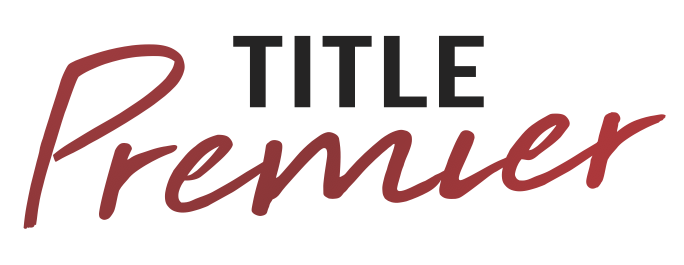SUPPORT FROM PROVEN UNDERWRITERS & THE PROTECTION
OF TITLE INSURANCE
Underwriters, through the title insurance policy, will support property owners for as long as they own the property. Are you working with a title company supported by top-rated underwriters that can protect you for years or decades to come?
WHAT HAPPENS DURING THE TITLE PROCESS?
While a buyer is under contract to purchase a property, the title company searches for any possible barriers to producing a clear title for that property. Possible title issues, called title defects, could include unresolved encumbrances, mistakes on past deeds, past forgeries, or unpaid liens. If a defect is found, the title company works to address the issue and provide clear title.
The actions and decisions made by the title company to clear possible defects are supported by underwriters. If a title company has a history of excellent title resolution, it will receive the support of top-rated underwriters. The strength of an underwriter is calculated based on criteria such as financial reserves and liquidity, operating performance and profitability, and competitive market position. To preserve their ratings, the strongest underwriters will only support the best title companies.
Once the title process is complete, the buyer will receive a title insurance policy at closing. The title insurance policy protects the buyer from another entity making a claim to that property. This policy will protect the buyers for as long as the buyer owns that property. This is why it is vital to work with a title company who is supported by top-rated underwriters, issuing the most protective title insurance.
Title Premier works with two of the top-rated underwriters, Old Republic and Fidelity.


HOW ARE UNDERWRITERS RATED?
AA - Judged to be of high quality and are subject to very low credit risk.
A - Judged to be upper-medium grade and are subject to low credit risk.
BAA - Judged to be medium-grade and subject to moderate credit risk and as such may possess certain speculative characteristics.
BA - Judged to be speculative and are subject to substantial credit risk.
B - Considered speculative and are subject to high credit risk.
CAA - Judged to be speculative of poor standing and are subject to very high credit risk.
CA - Highly speculative and are likely in, or very near, default, with some prospect of recovery of principal and interest.
C - Lowest rated and are typically in default, with little prospect for recovery of principal or interest.
HOW CAN A BUYER GET THE MOST PROTECTION FROM TITLE INSURANCE?
For the highest level of protection, buyers must work with a title company supported by a top underwriter. Title Premier is backed by AA-rated Old Republic and A-rated Fidelity, two of the highest rated underwriters in the United States. Old Republic is the only underwriter in the country to earn the prestigious AA rating.
TITLE-RATED TERMS
Clear Title: A property title that has no defects. Properties with clear titles are marketable for sale.
Closing Protection Letters (CPL): A document issued by the title insurance company to insured lenders and, in some unusual cases, to insured owners. The letter indicated the title insurer's responsibilities for negligence, fraud, and errors that might be made when their agents or approved attorneys handle the closing.
Escrow: Funds held in an account to be used by the lender to pay for home insurance and property taxes. The funds may also be held by a third party until contractual conditions are met and then paid out.
Good Faith Estimate: An estimate of all closing fees including prepaid and escrow items as well as lender charges; must be given to the borrower within three days after submission of a loan application.
HUB1 Statement: A form used by the closing agent to itemize all charges imposed upon a borrower and seller for a real estate transaction. It gives each party a complete list of their incoming and outgoing funds.
Lien Waiver: A document that releases a consumer (homeowner) from any further obligation for payment of a debt once it has been paid in full. Lien waivers typically are used by homeowners who hire a contractor to provide work and materials to prevent any subcontractors or suppliers of materials from filing a lien against the homeowner for nonpayment.
Mechanic's Lien: Typically used by subcontractors and suppliers, mechanic's liens are a legal claim against property that has been remodeled or improved. Once the debt has been paid, the lien is lifted.
Recording: The recording in a registrar's office of an executed legal document. These include deeds, mortgages, satisfaction of a mortgage, or an extension of a mortgage making it a part of the public record.
Recording Fees: Charges for recording a deed with the appropriate government agency.
Title Defect: An outstanding claim on a property that limits the ability to sell the property. Also referred to as a cloud on the title.
Title Insurance: Insurance that protects the lender against any claims that arise from arguments about ownership of the property; also available for homebuyers. An insurance policy guaranteeing the accuracy of a title search protecting against erros. Most lenders require the buyer to purchase title insurance protecting the lender against loss in the event of a title defect. This charge is included in the closing cost. A policy that protects buyers from title defects is known as an owner's policy and requires an additional charge.
Title Search: A check of public records to be sure that the seller is the recognized owner of the real estate and that there are no unsettled liens or other claims against the property.
1031 Exchange: IRS tax code stating that no gain or loss shall be recognized on the exchange of property held for productive use in a trade or business or for investment if such property is exchanged solely for property of like kind which is to be held either for productive use in a trade or business or for investment.
